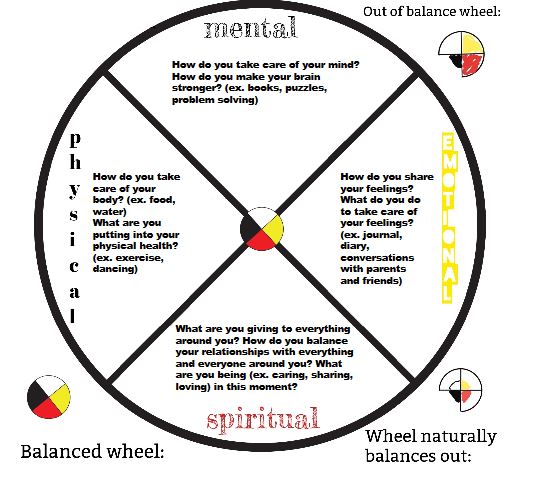During EDUC 491 I tried to have as much awareness as I could when it came to EDUC 446. I knew I would have to take time to focus on myself and the needs of myself so that my students could have the best version of me. I used the medicine wheel that Tina Fraser introduced the cohort to as a guideline on how to take care of every part of me so I could teach the students how to take care of every part of themselves. The physical and emotional part of me was a mess during practicum because there weren’t enough hours in the day to do everything I wanted to do. I put every part of me into the classroom and my mental health suffered and I didn’t want that side of me to be seen by the students. On days that the students just needed to get out of the confines of the classroom, we went for a walk. This took care of our physical portion of the medicine wheel without even realizing that we were also contributing to our mental health because fresh air is amazing for our brains. Tina made every portion of the Medicine Wheel clear to our cohort and having optimal health was a point she highlighted nicely. Having optimal health provides a good base from which we can respond to our normal everyday. When our physical health is not in good shape, it can lead to increased worry to losing our “zing” for life or reducing the amount of good emotions we are capable of. It affects our resilience and makes it harder to return to your natural state. At the end of practicum I am feeling my lack of physical health.
Tina taught that thoughts, feelings, and emotions are integral components of the body and soul. Our mental and emotional health are often what others notice first when things are not going well. Important to maintain balance and to ensure that our mental health equips us with the resilience we need to face in life’s journeys. This is such a huge component of teaching because teachers juggle so many roles on a daily basis.
Unbeknownst to me, I was contributing to my spiritual health by reflecting daily. Tina highlighted that our spiritual health is one of the most important yet most overlooked cornerstones of health. Who we are, our sense of belonging and our ability to have faith in a higher power all contribute to a strong spirit. A strong spirit means knowing our own identity and being content with who we are and spending time reflecting or doing things that make us happy. During practicum I was able to make time once a week to walk my dogs with my husband and that was something I took the time to make myself happy with. I also spent a vast amount of time reflecting during practicum and shifting or adapting on the fly when something was not working the way I wanted it to.
The lesson of the Medicine Wheel links with First Peoples Principles of Learning because every part of the wheel is about looking at ourselves and about incorporating the 4 “L”s into our practice, Looking, Listening, Learning and Language. As I continue the reflective practice of teaching I have learned that as Canada, BC and its school system continue on the path toward Reconciliation, and creating education systems that support the needs of Indigenous learners, families, and communities, that I do my part and continue to learn about new ways that I can holistically teach.
